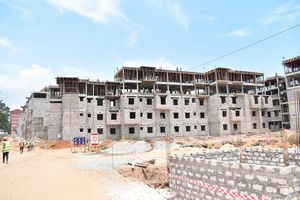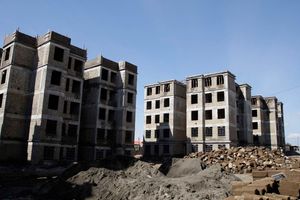
Affordable Housing Project in Elburgon, Nakuru County on July 12, 2024.
Defaulters of affordable housing loans will have a shorter window to regularize their mortgages before their homes are auctioned should the Senate ratify a fresh amendment to the Land Act 2012.
The Business Laws (Amendment) Bill, 2024 proposes to slash the life line given to defaulters of affordable home loans to repair their credit history from the normal 90 days to 45 days, an incentive to banks and other financial institutions who might want to provide mortgages to first-time home owners under the affordable housing programme.
While the proposal works for banks, it will squeeze low-income home owners, most of whom are in the jua kali sector where they are prone to economic shocks as they don’t have stable sources of income.
“Section 90 of the Land Act is amended… in subsection (2) by inserting the following proviso at the end of paragraph (b) — Provided that for purposes of affordable housing the timeline specified in this paragraph shall be forty-five days,” reads the Government-backed bill which was tabled in Senate by the Leader of Majority Party Aaron Cheruiyot.
The public had until the end of last Tuesday (April 15) to give their sentiments on the controversial proposed law, which critics argue is likely to reverse any gains of providing universal home ownership.
Failure to regularize the loan, the bank will normally give you another 40 days before signing a contract for sale of your mortgaged property.
However, the government has proposed to reduce this to 20 days in a proposal that Kenyans have until Tuesday to give their inputs.
President William Ruto’s government wants to build at least 200,000 low-cost houses every year under the affordable housing programme (AHP), which is financed through the collection of 1.5 percent levy mostly from salaried workers.
The programme targets millions of poor Kenyans, including the urban poor living in slums, who can’t afford costly mortgages offered by commercial banks.
For the developers, demand for the houses will be guaranteed through the collection of the affordable housing levy. The money from the levy can be channeled to the National Housing Corporation, which can use the cash to develop houses. They can also be lent directly to Kenyans who can then use it to buy affordable homes.
Additionally, beneficiaries of affordable houses can borrow from commercial banks, microfinance banks and savings and credit cooperative societies (Saccos).
Because the affordable housing program targets low and middle-income earners, who may have fewer stable incomes or be more susceptible to economic downturns, there has been a heightened risk of default.
One of the ways Kenya has tried to reduce the risk for lenders and encourage their participation in affordable housing finance is through the formation of the Kenya Mortgage Refinance Company (KMRC), which will send billions of shillings to retail lenders for onward lending of cheap mortgages to workers. The KMRC reckons the interest rate on the mortgages they refinance are supposed to be in the single digit.
The units comprise social housing units (bed-sitters) earmarked for persons earning less than Sh20,000 per month, affordable housing for workers with income of between Sh20,000 and Sh149,000 and affordable middle-class housing for those earning more than Sh149,000.
Last week, the KMRC announced that it would extend loans to the millions of non-salaried Kenyans, a section of the Kenyan population that have been shunned by lenders due to their high risk of default owing to their erratic income.
The KMRC announced that non-salaried workers will access subsidized mortgages of up to Sh6 million under a State-backed scheme that covers nearly half of the credit in the event of default.
A newly formed firm, the Kenya Mortgage Guarantee Trust (KMGT), will provide the guarantee. The firm will pay up to 40 percent of defaulted mortgages, with lenders shouldering the remainder of the risk.
“The whole mechanism is expected to encourage financial institutions (banks and Saccos) to go far down the market. The cover provides a default loss protection to the financial institutions,” KMRC chief executive Johnstone Olteita told the Business Daily in an earlier interview.
Real estate was one of the major contributors to the high ratio of gross non-performing loans (NPLs) to gross loans, which stood at 17.2 percent in February 2025 compared to 16.4 percent in December 2024, according to the data from the Central Bank of Kenya (CBK).
In a sector report published on Treasury’s website, the State Department for Housing and Urban Development disclosed that it plans to build 363,860 housing units between 2024 and 2032.












